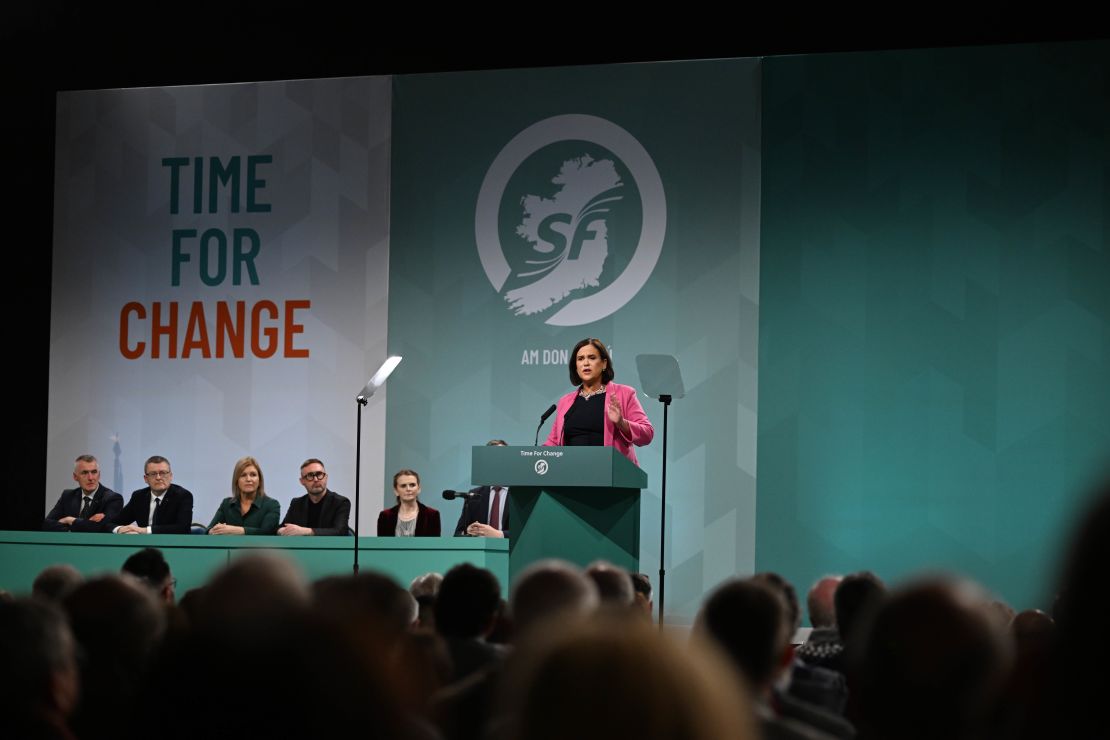CNN
—
Prime Minister Leo Varadkar sent shockwaves through Ireland when he candidly announced he was “no longer the best person” to lead his country.
The taoiseach took journalists, opposition lawmakers and even members of his own government by surprise with his decision to step down for what he called “personal” but “mainly political” reasons.
The 45-year-old had become a familiar face on the international stage, having made headlines in 2017 when aged 38 he became the youngest prime minister in Irish history. Ireland’s first gay, mixed race leader soon became the face of a new and more liberal Ireland, shepherding in progressive social change through a string of successful referendums.
He had taken up the role of taoiseach again in December 2022 as part of a job rotation agreed by the coalition government formed after the 2020 general election.
In recent weeks, Varadkar had drawn praise for his solidarity with the people of Gaza, challenging President Joe Biden over sustained US support for Israel during a stateside visit last week.
Irish Times political correspondent Jennifer Bray was given less than an hour’s notice of the surprise statement from the taoiseach on Wednesday. Bray told CNN that the resignation came as a “bolt from the blue for everyone.”
Gary Murphy, Professor of Politics at Dublin City University, said there was a “certain humility” to the speech, not typically associated with a politician often perceived to be “aloof” and “lacking the common touch.”
Murphy said “a taoiseach resigning without any pressure from his party to do so is really unprecedented in the Irish state.”
Even Varadkar seemed to be still catching his breath on Thursday afternoon when he told reporters gathered in Brussels for an EU leaders summit that the decision still hadn’t “sunk in.” He tried to dispel rumors that a scandal may be lurking on the horizon, stressing there was “no event” or “one thing” that prompted his resignation.
Despite this, questions linger over the timing of his decision, less than three months out from local and European elections. His successor, largely tipped to be Higher Education Minister Simon Harris, will need to lead the center-right political party, Fine Gael, against a fired-up opposition.
Leo Varadkar has often been described by commentators as a “man in a hurry,” having scored the country’s top job after less than 10 years in politics. Following a short-lived career as a doctor, Varadkar rose rapidly to the top, cutting his teeth in high-profile jobs as health minister and transport minister.
After he was appointed taoiseach in 2017, he quickly touted himself as a leader for the people “who get up early in the morning,” promising to bring financial prosperity and stability to Ireland in the wake of a devastating financial crash.
And although opposition figures and some commentators branded him a “Thatcherite” proponent of neo-liberalism, Murphy insists Varadkar “never governed like that.”
“His administration, even before [the Covid-19 pandemic] wasn’t shy about spending public money, it was just that they got no political capital or credit,” Murphy said.
Varadkar’s steady leadership during the pandemic was not something to be scoffed at, Murphy added. The Irish government took a more cautious approach to lockdown measures which, though at times unpopular, did culminate in significantly lower case numbers and death rates than its closest neighbor, the United Kingdom.
He also scored a significant victory with his handling of the Brexit saga, Bray said, pointing towards his success in “breaking the deadlock around a no-deal Brexit” in 2019. His skill in handling former UK Prime Minister Boris Johnson “did not resonate with the Irish public though, who wanted to hear less about Brexit and more about the solutions to what was a deepening housing and homelessness crisis,” according to Bray.
Varadkar’s management of the housing crisis in particular will likely be the greatest mark on his legacy. Under both terms as taoiseach, the failure of his government to hit targets for affordable housing has left a generation of young voters unable to purchase homes.
Under his tenure, Ireland did manage to shed some of the conservative societal norms propagated by the Catholic Church, through referendums legalizing same-sex marriage and lifting an abortion ban. This strong track record came to an end in early March, when a referendum to remove a constitutional reference to a woman’s place being in the home was resoundingly rejected, in a bruising defeat to Varadkar and his government.
The “sheer scale” of the loss has “to have had an impact on his decision to go,” Murphy commented, saying Varadkar may have felt “some responsibility” for that.
As several political heavyweights, including finance minister and Eurogroup chairman Paschal Donohoe, declined to throw their hat in the ring, the stage is set now for Simon Harris to become the next taoiseach.
The 37-year-old who rose to prominence during his spell as health minister during the pandemic is considered by many to be a “mirror image” to Varadkar, Murphy said. A more affable and effective communicator however, Harris has built up a large online following through his frequent use of platforms such as Instagram and Tik Tok.
“Simon Harris has promised to bring energy and vigor to the role, and Fine Gael will be hoping that he can connect them to an increasingly distant electorate: younger voters,” Bray said.

He will face a galvanized opposition in the form of Irish nationalist party Sinn Féin, who have been making steady gains since their impressive election success in 2020. The party, led by Mary Lou McDonald, has leveraged the government’s failure to tackle the housing issue in particular, promising the electorate that it has the policies to end the crisis.
The main question is whether Harris has “the political substance behind the polish,” Murphy added, saying his “big challenge” will be to present some ideas that “will catch the voters” ahead of the next general election, which must take place before March 2025.

